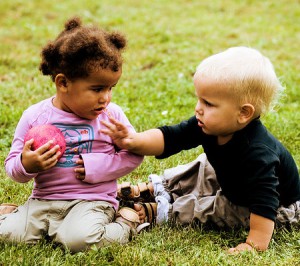On a play date at the park, one toddler, Mia, grabs a toy from her toddler friend, Piper. Piper starts screaming and crying, so her mom hands her a new toy. Piper looks a little confused and frustrated, but she stops crying. Then, Mia reaches to grab the new toy from Piper. But Piper’s mom stops her before she takes it, telling Mia, “Sorry, honey, but that’s Piper’s toy and she’s still playing with it. She’ll be happy to share it with you in a few minutes, when she’s done.”
Piper’s mom sees a displeased look on Mia’s mom’s face, and asks if that was OK. Mia’s mom explains, “Well, I don’t really believe in sharing”.
Why wouldn’t you believe in sharing?
Some parents, like Mia’s mom, feel sharing doesn’t reflect how things are done in adulthood. For example, if an adult came up to you and asked for your car keys, you wouldn’t just hand them over. So why make kids share?
Mia’s mom explained that her Mommy and Me instructor also somewhat discouraged sharing. When she had other kids over for a play date, she would ask her son, in advance, if there were any toys he didn’t want the other kids to touch and she would hide those toys.
Many articles support this position too, suggesting that forcing a child to share is unnatural and unfair. For example, how would you expect a child to feel if you gave him a book, then took it away after they read half a page so their sibling could have a turn, in the spirit of “sharing”?
Other parents suggest just letting the kids work it out, as long as no one gets hurt. The theory is that this allows the kids to learn how to interact with each other. And if one kid wants to keep a toy, they’ll learn to hold onto it.
So when Mia takes a toy from Piper, Mia’s mom doesn’t feel parental intervention is needed or appropriate, in the spirit of “sharing”. Besides, five minutes ago, Piper took and played with one of Mia’s toys, so this isn’t a one-way behavioral issue.
Why would you believe in sharing?
Piper’s mom went on a play date last week with a little girl who goes to daycare several times each week. Piper and that child were passing toys back and forth, to each other. And they both seemed to really enjoy playing with the “new” toys that the other child brought. Piper’s mom loved seeing Piper play nicely with other kids—she feels like playing nicely will make her more likable and will serve her better in life.
Piper’s mom also plans to have another child, at some point. She really wants both kids to share or take turns to keep the peace in the house.
Piper’s mom sees the adult world as being full of sharing and taking turns, too. At the grocery story, she waits in line for her turn. At home, she shares her bed, bathroom, microwave, TV remote, food, and sometimes her car with her husband. At work, she shares resources with her team, like the printer or sometimes printouts at a meeting. She and her friends loan each other clothes sometimes and share food at get togethers. So she sees sharing as an important adult skill too.
Piper was the littlest in her Mommy and Me class, and the bigger kids frequently took her toys, leaving her crying. Piper’s mom learned she couldn’t take a toy back from another child, because that would be modeling the behavior she wants to discourage (and the other child’s mom might kill her). But, she learned that she could model the appropriate communication, for Piper, by telling the other child that she would share when she was done.
Piper’s mom agrees that it’s unfair to take away a toy while a child is playing with it, in many cases. But she feels this supports the idea that other children shouldn’t take away one of Piper’s toys while Piper is playing with it. That said, she also feels it’s valuable for Piper to learn limits—Sometimes she’ll expect Piper to let go of things even though Piper doesn’t want to, like a steak knife, the dog’s ear, or a toy that someone else was playing with first.
So what’s the answer?
Thankfully, on this park play date, the moms both shared their perspectives quietly and seemed to enjoy, or at least respect, the other’s perspective. And their kids went on playing and it was fine. But the questions remain unanswered…
Should Mia’s mom have to deal with other parents imposing their parenting views on her child? Should Piper continue to give up her toys whenever a stronger child grabs them? Or, are both parents missing the point?
Lots of schools and playgrounds have policies to solve this, but what’s the right compromise? And which is better for the kids in the long run—sharing or not? Does the answer depend on the kid? Should we teach our kids to share?
You can automatically receive Mama Lovejoy blog posts in your Facebook newsfeed by liking the Mama Lovejoy Facebook page.
